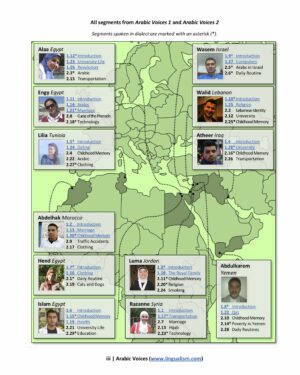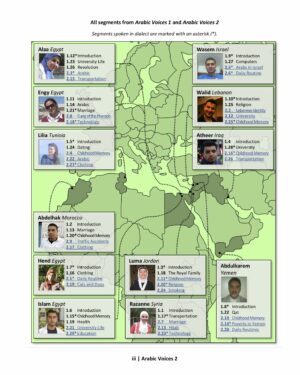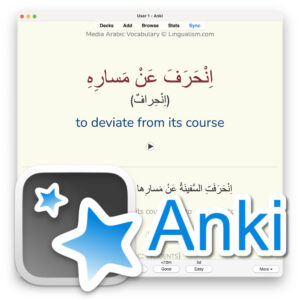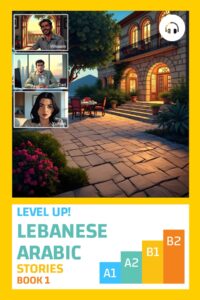Home » Modern Standard Arabic » Hijab–Razanne
Hijab–Razanne
| Greetings and welcome! [00:00.2] | السلام عليكم ورحمة الله وبركاته، أهلًا ومرحبًا بكم. | |
| Today we will talk about what Razanne said about her wearing the hijab and the different situations she was exposed to in America, we will comment on the different terms and words she used. [00:05.0] | اليوم سنتحدّث عمّا قالته رزان بشأن ارتدائها للحجاب وما تعرّضت له من مواقف مختلفة في أمريكا، سنقوم بالتعليق على ما استخدمته من مصطلحاتٍ وكلماتٍ مختلفة. | |
| We start on page 71, where Razanne says on line 2, "I live in America, I am exposed to many questions on the road, in the market, at work, or anywhere." [00:18.0] | ونبدأ في الصفحة الواحد والسبعون، حيث تقول رزان في السطر الثاني: (أعيش في أمريكا، فأنا أتعرّض للكثير من الأسئلة في الطريق أو في السوق أو في العمل أو في أي مكان). | |
| Razanne here uses the verb يتعرّضُ (to be exposed), and when using the verb يتعرّضُ to something, we use the preposition لـ after it, so she says, "I was exposed to a situation" or "I was exposed to an accident" or "I was exposed to different situations, an accident, I was exposed to a serious matter," and so on. You use the preposition لـ after the verb يتعرّضُ or تعرّض لـ. [00:32.9] | وتستخدم رزان هنا الفعل [يتعرّضُ]، وعند استخدام الفعل [يتعرّضُ] لأمرٍ ما، نستخدم حرف [ اللام] بعده، فتقول: (تعرّضت لموقف) أو (تعرّضت لحادثة) أو (تعرّضت لمواقف مختلفة، لحادثة، تعرّضت لأمر خطير)، وهكذا، فتستخدم حرف [ اللام] بعد الفعل [يتعرّض] أو [تعرّض لـ]. | |
| We then move to line 5 where Razanne says, "Once I was in the market, a middle-aged woman came to me." [01:00.8] | ننتقل بعد ذلك إلى السطر الخامس، حيث تقول رزان: (مرة كنت في السوق فجاءت إليّ سيدة متوسطة العمر). | |
| This is one way you can start telling a particular story, starting by saying مرة or ذات مرة or في أحد المرات. [01:12.2] | وهذه أحد الطرق التي يمكنك أن تبدأ بها سرد قصة معينة، فتبدأ بقولك [مرة] أو [ذات مرة] أو [في أحد المرات]. | |
| Any of these phrases you can use if you want to begin telling a story. [01:24.0] | [مرة]، [ذات مرة]، [في أحد المرات] أيًا من هذه العبارات يمكنك أن تستخدمها إذا ما أردت أن تبدأ بحكاية قصة ما. | |
| She says, "Once I left my house and such-and-such happened; once I left my house such-and-such happened; or on one of the times I left my house such-and-such happened," starting with either of them to tell a story. [01:36.7] | تقول: (مرة خرجت من بيتي وحدث كذا وكذا، ذات مرة خرجت من بيتي حدث كذا كذا، أو في أحد المرات خرجت من بيتي حدث كذا وكذا)، تبدأ بأيٍ منهما لسرد قصة ما. | |
| We then move to line 10, where Razanne says, "Children are not obligated to them." [01:51.3] | ننتقل بعد ذلك إلى السطر العاشر، حيث تقول رزان: (الصغار ليس مفروضٌ عليهم). | |
| And we want to compare the negation here, and the negation in the next sentence on line 11, where Razanne says, "I answered her: “No,” it is not imposed on them." [02:00.1] | ونريد أن نقارن بين النفي هنا، والنفي في الجملة التي تليها في السطر الحادي عشر، حيث تقول رزان: (فأنا أجبتها: "لا" غير مفروض عليهم). | |
| On line 10, she says, "It is not imposed on them," and on line 11 she says, "It is not imposed on them." [02:15.0] | في السطر العاشر تقول: (ليس مفروض عليهم)، في السطر الحادي عشر تقول: (غير المفروض عليهم). | |
| And ليس and غير you can use either of them for the negation, especially if you want to negate a specific adjective, say "he is not a mujtahid" or "he is not a mujtahid." "this is not acceptable" or "this is not acceptable." Both true to use negation. [02:21.5] | و[ليس] و[غير] يمكنك استخدام أيًا منهما للنفي، وخاصةً إذا ما أردت أن تنفي صفة معينة، تقول (هو ليس مجتهد) أو (هو غير مجتهد) (هذا أمر ليس مقبول) أو (هذا أمر غير مقبول)، كلاهما صحيح لاستخدام النفي، | |
| You can use ليس and غير for the negation, to negate an adjective as you see here 'not imposed on them' or 'not imposed on them,' both of which are true. [02:43.2] | فيمكنك استخدام [ليس] أو [غير] للنفي، لنفي صفة ما كما ترى هنا (ليس مفروض عليهم) أو (غير مفروض عليهم)، كلاهما صحيح. | |
| We then move to line 14, where Razanne says, "And I wear it because I am a Muslim," so to mention the reason Razanne uses here the word لأن (because) of causation. [02:56.2] | ننتقل بعد ذلك إلى السطر الرابع عشر، حيث تقول رزان: (وأنا أرتديه لأنني مسلمة)، فلذكر السبب تستخدم رزان هنا كلمة [لأن] السببية. | |
| She says, "I study because I am diligent; I do good because I love it," and so, when the reason is given, she says… You can use لأن. [03:10.6] | تقول (أنا أذاكر لأني مجتهد، أنا أفعل الخير لأني أحبه)، وهكذا، عند ذكر السبب تقول… يمكنك استخدام [لأن]. | |
| On line 15, Razanne uses another word to mention the reason, which is the word لكي (for). [03:22.2] | وفي السطر الخامس عشر تستخدم رزان كلمة أخرى لذكر السبب وهي كلمة [لكي]. | |
| We had previously referred to this word and how we use it to connect two different sentences, and to mention the reason 'for your body to cover your body,' you can refer to the video to which we have referred or in which we have indicated the use of this word. [03:29.0] | وكنا قد أشرنا إلى هذه الكلمة من قبل وكيف نستخدمها للربط بين جملتين مختلفتين، ولذكر السبب (لكي تستري جَسمك جِسمك) يمكنك الرجوع إلى الفيديو الذي كنا قد أشرنا إليه أو كنا قد أشرنا فيه إلى استخدام هذه الكلمة. | |
| On line 17, Razanne says, "This is beautiful and it is…" Or Ms. Razanne said, "This is beautiful and it is…, I am sure it is difficult at this time," so Razanne uses here a word or phrase في هذا الوقت (at this time) to refer to the era in which we live In it… the era we live in في هذا الوقت، في هذه الأيام (at this time, these days). [03:50.9] | في السطر السابع عشر- تقول رزان: (هذا جميل وهو)… أو قالت السيدة رزان: (هذا جميل وهو…، أنا متأكدة أنه صعب في هذا الوقت)، فتستخدم رزان هنا كلمة أو عبارة [في هذا الوقت] للإشارة إلى العصر الذي نعيش فيه… العصر الذي نعيش فيه [في هذا الوقت، في هذه الأيام]. | |
| And there… you can say 'in this time, in these days, in this age, in this time' which of any of these statements you can use to refer to the days in which we live now, and how they differ from what we lived before or from ages ago. [04:18.3] | وهناك… يمكنك أن تقول [في هذا الوقت، في هذه الأيام، في هذا العصر، في هذا الزمن] أيًا من أي من هذه العبارات يمكنك استخدامها للإشارة إلى الأيام التي نعيش فيها الآن، وكيف أنها تختلف عمّا كنا نعيشه من قبل أو عن عصور قد مضت. | |
| For example, you can say, "became from hard to make real friendships in this time—in this age—in this time—these days," and so use either of them to refer to the time we live in, 'in this time, in these days, in this age, in this time.' [04:40.1] | يمكنك أن تقول مثلًا: (أصبح من الصعب إقامة صداقات حقيقية في هذا الزمن—في هذا العصر—في هذا الوقت—في هذه الأيام)، وهكذا استخدم أيٍ منهما للإشارة إلى الوقت الذي نعيش فيه، [في هذا الوقت، في هذه الأيام، في هذا العصر، في هذا الزمن]. | |
| Great! We then move to line 27, and we would like to comment here quickly that when Razanne wanted to explain the type of clothes she was on line 26, she said, "short pants and summer clothes." [05:01.8] | عظيم! ننتقل بعد ذلك إلى السطر السابع والعشرون، ونودّ التعليق هنا سريعًا على أن رزان عندما أرادت أن تشرح نوع الثياب هي في السطر السادس والعشرين قالت: (سروال قصير ولباس صيفي). | |
| Then she resorted to using the English language to explain the concept of clothes, saying: "shorts and tank top." [05:20.8] | وبعد ذلك لجأت إلى استخدام اللغة الإنجليزية لشرح مفهوم الثياب فقالت: "shorts and tank top". | |
| This indicates that sometimes it is necessary to resort to Arabization of the word, or to use the word in another language. This is also in the Arabic language. [05:29.7] | وهذا يشير إلى أنه أحيانًا لابدّ من اللجوء إلى تعريب الكلمة، أو استخدام الكلمة في اللغة الأخرى. وهذا أيضًا في اللغة العربية. | |
| For example, the word جلباب (jilbab) in Arabic, when you say that the man was wearing the jilbab, this concept does not exist in English, sometimes you describe it as a long shirt or a… etc., but the word must be used in the language from which the word was borrowed, to explain the concept, This is evident on line 27. [05:41.4] | فمثلًا كلمة [جلباب] باللغة العربية، عندما تقول أن الرجل كان يرتدي الجلباب، فهذا المفهوم ليس موجود في الإنجليزية، أحيانًا تصفه بأنه قميص طويل أو ل… ما إلى ذلك، ولكن لابدّ من استخدام الكلمة في اللغة التي استعارت منها الكلمة، لشرح المفهوم، وهذا واضح في السطر السابع والعشرون. | |
| On line 35, we see how Razanne uses again the word لأن (because) to mention the reason, the lady asked her, "Do you wear a headscarf because you have no hair." [06:06.8] | في السطر الخامس والثلاثون نرى كيف استخدمت رزان مرة أخرى كلمة [لأن] لذكر السبب، فالسيدة سألتها (هل أنت ترتدين غطاء الرأس لأن ليس لديك شعر)، | |
| She uses again لأن (because) to say why, and we've already mentioned that in this video, but I wanted to stress this... on using that word, that's another example. [06:22.4] | فهي تستخدم مرة أخرى [لأن] لذكر السبب، وكنا قد أشرنا إلى ذلك في هذا الفيديو سابقًا، ولكن وددت التأكيد على هذا… على استخدام هذه الكلمة، فهذا مثال آخر. | |
| On line 8… on line 38, Razanne says "I love…" On line 38 Razanne says, "But I can’t, I don’t like to show it to all people." [06:43.7] | في السطر الثامن… في السطر الثامن والثلاثون تقول رزان أحب… في السطر الثامن والثلاثون تقول رزان: (ولكن لا أستطيع، لا أحب أن أريه إلى كل الناس). | |
| And... we would like to point out here that the verb يحب (likes) is followed by the masdar, whether the explicit infinitive or the interpreted infinitive 'I like to study' or 'I like to study.' Both are correct. It's a verb followed by the infinitive. [07:06.4] | و... نودّ الإشارة هنا إلى أن الفعل [يحب] يليه [المصدر]، سواء ما إذا كان المصدر الصريح أو المصدر المؤول (أحب المذاكرة) أو (أحب أن أذاكر) كلاهما صحيح، هو أحد الأفعال التي يليها المصدر. | |
| On line 41, Razanne says, "Because I hide these aesthetic matters in my body and hair, and all these things I hide and I hide only for my husband." [07:23.0] | في السطر الر… الواحد والأربعون—تقول رزان: (لأنني أخفي هذه الأمور الجمالية في جسمي وشعري، وهذه الأمور كلها أخفيها وأخبئها فقط لزوجي). | |
| Razanne here uses the word فقط (only) for personalization, she says that this matter only pertains to my husband, she says 'only to my husband,' and you can use the word 'only' to personalize to mention… to assign something, to a specific thing. [07:37.1] | تستخدم رزان هنا كلمة [فقط] للتخصيص، فهي تقول أن هذا الأمر يخص زوجي فقط، فتقول (فقط لزوجي)، ويمكنك أن تستخدم كلمة [فقط] للتخصيص لذكر… لتخصيص أمرٍ ما، لشيءٍ محدد. | |
| You can also use the word فحسب (only), فقط (only) or فحسب (only). Both are correct. [07:57.5] | ويمكنك كذلك أن تستخدم كلمة [فحسب]، [فقط] أو [فحسب] كلاهما صحيح. | |
| For example, you can say, "I read only for pleasure" or "I read only for enjoyment." "I read only for pleasure" or "I read only for pleasure." [08:04.1] | فمثلًا يمكنك أن تقول:(أنا أقرأ فقط للاستمتاع) أو (أنا أقرأ للاستمتاع فحسب)، (أنا أقرأ فقط للاستمتاع) أو (أنا ف… أقرأ للاستمتاع فحسب). | |
| As you can see here, you can use فقط (only) before the masdar or after the masdar. "I'm reading only for enjoyment" or "read only for enjoyment," you can use فقط before the masdar or after the masdar. [08:18.1] | وكما ترى هنا يمكنك أن تستخدم [فقط] قبل المصدر أو بعد المصدر (أنا أقرأ فقط للاستمتاع) أو (أقرأ للاستمتاع فقط)، يمكنك أن تستخدم [فقط] قبل المصدر أو بعد المصدر. | |
| But فحسب (only) must come at the end of the sentence, saying 'I read only for enjoyment,' and not I read only for enjoyment, the meaning is different here, it must be mentioned فحسب at the end of the sentence; [08:34.0] | ولكن [فحسب] لابدّ وأن تأتي في نهاية الجملة، فتقول (أنا أقرأ للاستمتاع فحسب)، وليس أنا أقرأ فحسب للاستمتاع، يختلف المعنى هاهنا، فلابدّ من ذكر [فحسب] في نهاية الجملة؛ | |
| But فقط may come before the masdar or after the masdar. "I only write the important ideas" or "I only write the important ideas," not... you don't have to use the masdar, [08:50.1] | ولكن [فقط] قد تأتي قبل المصدر أو بعد المصدر (أنا أكتب فقط الأفكار الهامة) أو (أنا أكتب الأفكار الهامة فقط) ليس… لا يلزمك أن تستخدم المصدر، | |
| But [only] may come after the verb or at the end of a sentence; But فحسب has to come at the end of the sentence. 'I only write important ideas, I only write important ideas, I only write important ideas,' but you can't say I only write important ideas. [09:05.6] | ولكن قد تأتي [فقط] بعد الفعل أو في نهاية الجملة؛ ولكن [فحسب] لابدّ أن تأتي في نهاية الجملة (أنا أكتب فقط الأفكار الهامة، أنا أكتب الأفكار الهامة فقط، أنا أكتب الأفكار الهامة فحسب)، ولكن لا يمكنك أن تقول أنا أكتب فحسب الأفكار الهامة. | |
| With this, we have finished commenting on what Razanne said about the veil, and her experience with the veil in America. [09:29.3] | وبهذا نكون قد انتهينا من التعليق عمّا قالته رزان بشأن الحجاب، وخبرتها مع الحجاب في أمريكا. | |
| I hope you have benefited from this video. [09:40.9] | أتمنى أن تكونوا قد استفدتم من هذا الفيديو. | |
| Meet you in another video, and peace, mercy and blessings of God be upon you. [09:43.2] | ألقاكم في فيديو آخر، والسلام عليكم ورحمة الله وبركاته. |
Video Lessons
Arabic Voices MSA Lessons
Arabic teacher Mostafa Ahmed takes us through segments in MSA from Lingualism's book Arabic Voices 1: Authentic Listening and Reading Practice in Modern Standard Arabic and Colloquial Dialects, explaining interesting points of grammar and vocabulary.










